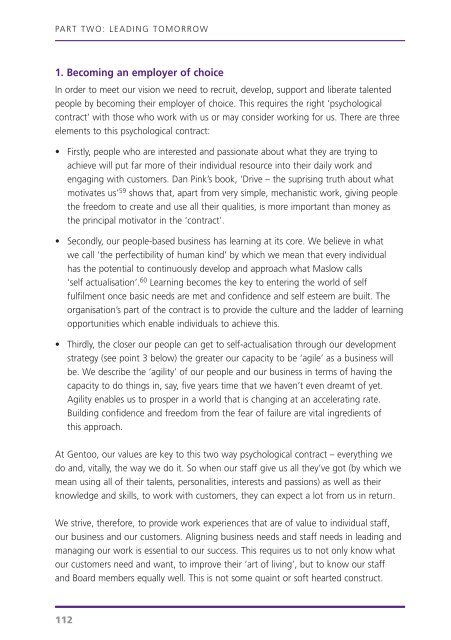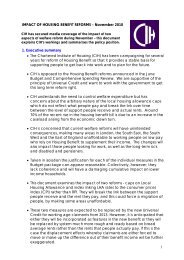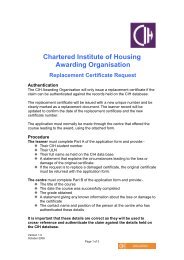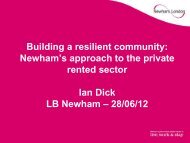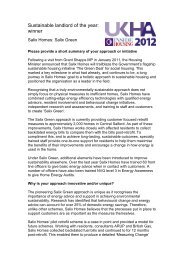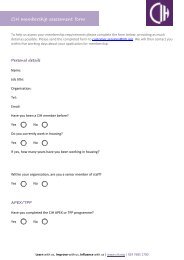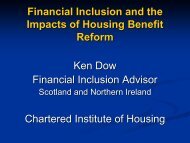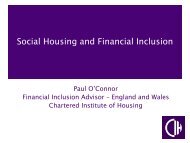View publication - Chartered Institute of Housing
View publication - Chartered Institute of Housing
View publication - Chartered Institute of Housing
You also want an ePaper? Increase the reach of your titles
YUMPU automatically turns print PDFs into web optimized ePapers that Google loves.
PART TWO: LEADING TOMORROW<br />
1. Becoming an employer <strong>of</strong> choice<br />
In order to meet our vision we need to recruit, develop, support and liberate talented<br />
people by becoming their employer <strong>of</strong> choice. This requires the right ‘psychological<br />
contract’ with those who work with us or may consider working for us. There are three<br />
elements to this psychological contract:<br />
• Firstly, people who are interested and passionate about what they are trying to<br />
achieve will put far more <strong>of</strong> their individual resource into their daily work and<br />
engaging with customers. Dan Pink’s book, ‘Drive – the suprising truth about what<br />
motivates us’ 59 shows that, apart from very simple, mechanistic work, giving people<br />
the freedom to create and use all their qualities, is more important than money as<br />
the principal motivator in the ‘contract’.<br />
• Secondly, our people-based business has learning at its core. We believe in what<br />
we call ‘the perfectibility <strong>of</strong> human kind’ by which we mean that every individual<br />
has the potential to continuously develop and approach what Maslow calls<br />
‘self actualisation’. 60 Learning becomes the key to entering the world <strong>of</strong> self<br />
fulfilment once basic needs are met and confidence and self esteem are built. The<br />
organisation’s part <strong>of</strong> the contract is to provide the culture and the ladder <strong>of</strong> learning<br />
opportunities which enable individuals to achieve this.<br />
• Thirdly, the closer our people can get to self-actualisation through our development<br />
strategy (see point 3 below) the greater our capacity to be ‘agile’ as a business will<br />
be. We describe the ‘agility’ <strong>of</strong> our people and our business in terms <strong>of</strong> having the<br />
capacity to do things in, say, five years time that we haven’t even dreamt <strong>of</strong> yet.<br />
Agility enables us to prosper in a world that is changing at an accelerating rate.<br />
Building confidence and freedom from the fear <strong>of</strong> failure are vital ingredients <strong>of</strong><br />
this approach.<br />
At Gentoo, our values are key to this two way psychological contract – everything we<br />
do and, vitally, the way we do it. So when our staff give us all they’ve got (by which we<br />
mean using all <strong>of</strong> their talents, personalities, interests and passions) as well as their<br />
knowledge and skills, to work with customers, they can expect a lot from us in return.<br />
We strive, therefore, to provide work experiences that are <strong>of</strong> value to individual staff,<br />
our business and our customers. Aligning business needs and staff needs in leading and<br />
managing our work is essential to our success. This requires us to not only know what<br />
our customers need and want, to improve their ‘art <strong>of</strong> living’, but to know our staff<br />
and Board members equally well. This is not some quaint or s<strong>of</strong>t hearted construct.<br />
112


